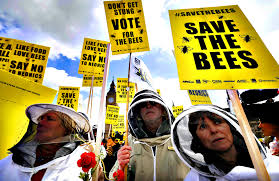Nonetheless, it has persisted for 10 years despite data showing that periodic die-offs in bees are as common, and therefore predictable, as solar cycles and California droughts. From the time that records of bees were formally kept, there were reports of mass die-offs without explanation, a thousand years before pesticides even existed.
But pesticides are the moneymaker. Activists can't gather $1 billion per year complaining about nature, like parasites. Yet despite some short-term buzz, the arguments rang hollow. Targeted seed pesticides, like the neonicotinoids that replaced broad-spectrum spraying, were the go-to fundraising claim until it was shown that bees were not declining everywhere they were used. In places like Australia, they didn't decline at all, while in northern Europe bee numbers correlated better to land use changes. More bees died in truck accidents hauling around bees to places where they were supposedly in decline, and due to beekeeping amateurs not knowing what they were doing, than can be attributed to science.

Once it was revealed that honeybees were actually at a 20 year high, environmentalists wisely changed tack - they began to claim instead that wild bees were dying due to pesticides. This was smarter, because we can't actually count wild bees. There is not even a baseline. Of the 25,000 species of bees worldwide, only 7 even have hives in which they could be counted. If the only number is guesswork, then guess at a baseline and then use guesswork later to claim it has declined.
That's what Center for Biological Diversity did. Using 'case studies' and no entomologists, they declared that 24 percent of wild bees are in danger and 52 percent are already in decline. How did they arrive at figures experts could not? They didn't, they simply wrote a review of other claims. Obviously that is a time-honored technique. When environmental litigators Center for Science in the Public Interest wanted to link coffee to breast cancer, they did the same thing. And then they did it about eggs, toast, butter, bacon, salt, sugar, etc. If you eat it, CSPI lawyers declared in lawsuits that it is killing people.
Did it work with wild bees? It sure did, mainstream media and other fundraising groups gushed over the claims. No one talked to Sam Droege, United States Geological Survey wildlife biologist and one of the foremost wild bee experts in the nation, except Richard Levine writing at Genetic Literacy Project, who quoted Droege as calling their document "extremely misleading." He should know, the "comprehensive review" contained data his group generated and he made nothing like their conclusions.
For a government scientist to condemn a document by a $14 million per year activist group as "extremely misleading" is rare, they are not really prone to hyperbole when it comes to being pro-science, lest they be called corporate shills. And they know their office will be swarmed with phone calls and emails demanding they be fired if they are critical of an environmental group.
But what else can a scientist say when a paper is written more like a litigator's plea for action than a work of evidence?
To the pro-science community, it is no surprise their work is such. The staff at CBD consists primarily of lawyers and phone solicitors, not scientists. Their Executive Director worked at the eco-terrorist group EarthFirst.
When it comes to climate science, researchers with government funding are not only unafraid to speak out, they make a point of doing it loudly and often. They are emboldened by support from their fellow scientists. But they get to be against corporations, which is politically easy in academia, whereas if you are pro-science about agriculture, you are implicitly helping businesses that grow food. For that reason, too many academics won't defend their own.
But that needs to change, if science is really what matters. A Science March on Earth Day won't help actual science if it only cares about the science their political allies don't deny. Scientists in agriculture need to defend each other. In this case, that so many academics have decried an elaborate anti-science marketing brochure shows that we are making real progress.
Now science journalists and journalism academics need to leave their political bubbles and do the same thing.





Comments